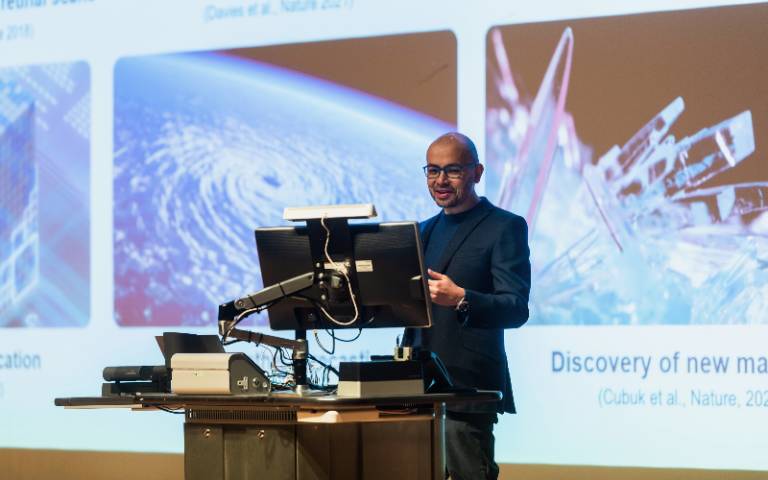The 2023 UCL Prize Lecture in Life and Medical Sciences has been delivered by UCL alumnus Demis Hassabis CBE, co-founder and CEO of Google DeepMind, one of the world's leading Artificial Intelligence research groups.

Speaking on the topic of 'Using AI to Accelerate Scientific Discovery', the world-renowned researcher and entrepreneur revealed how his childhood passions for chess and computer games led him to develop a deeper interest in computer science and thought processes.
Hassabis went on to complete a PhD in Cognitive Neuroscience under the supervision of Professor Eleanor Maguire at UCL in 2009, where he met future collaborator Dr Shane Legg (UCL Honorary Fellow 2016) at the Gatsby Computational Neuroscience Unit.
They co-founded DeepMind the following year, and the company was acquired by Google in 2014. It has consistently been at the forefront of AI development, producing landmark research breakthroughs such as AlphaGo (the first program to beat the world champion at the complex game of Go) and AlphaFold, heralded as a solution to the 50-year grand challenge of protein folding.
In his sold-out lecture, which was attended by more than 900 people in person and nearly 500 online, Hassabis argued that - if built responsibly - AI could be used for the overwhelming benefit of humanity and highlighted some of the incredible scientific breakthroughs that it has so far assisted.
He also discussed the possibilities of personalisation built on our "digital biology" in areas such as healthcare, the dangers of "deep fakes", and his hopes for the future of the field - including improving the planning, reasoning and memory of AI models.
"We are in the renaissance of scientific discovery," Hassabis said. "AI has incredible potential to help with humanity's greatest challenges. It will be one of the most transformative and beneficial technologies we will ever invent.
"I've always believed that. That's why I've worked on it my whole life."
Acknowledging public unease around AI, Hassabis said: "We have to build AI responsibly and safely and make sure it's used for the benefit of everyone to realise this incredible potential.
"My view is that we should not move faster and break things, which is the kind of Silicon Valley mantra; of course, it's been extremely useful in creating all sorts of amazing companies and services that we all use every day. But I think that this technology is just too important and too transformative to use that approach.
"Instead, I would advocate more of a scientific method, where we carefully consider each step, do controlled experiments, and try to understand how these things work and the unintentional consequences ahead of time.
"It's not possible to get that perfectly right, but with something moving this fast and this close to the frontier, there are always going to be mistakes. We should try and mitigate many of those risks ahead of time."
He added: "If we do that, and we eventually build AGI [Artificial General Intelligence], I feel like it could be the ultimate general purpose tool to help us understand the whole universe around us and maybe our place in it."
The UCL Prize Lecture in Life and Medical Sciences has been awarded by UCL since 1997 and provides a forum to debate and celebrate advancements. This year, the lecture was introduced by Professor Geraint Rees, UCL Vice-Provost (Research, Innovation & Global Engagement) and chaired by Professor Rachel McKendry (London Centre for Nanotechnology at UCL and UCL Division of Medicine).
"There are few people in the world who are able to talk about the emergence of AI with Demis' authority and insight", said Professor Rees. "We are proud of the links that he and Google DeepMind continue to foster with UCL, and grateful that he was able to share the benefit of his experience with our community.
"Our multi-disciplinary expertise positions us at the frontier of this 'fourth industrial revolution'. From self-driving cars to diagnostic tools for disease, UCL is ready to fully embrace the challenges and opportunities that this technology represents for people and planet."
During the Q&A session following the lecture, Hassabis - whose work has been cited over 100,000 times and has featured in Science's Top 10 Breakthroughs of the Year of five separate occasions - was asked by an audience member about the advice he would give to his younger self. He replied: "I could have been braver in moments.
"I think we need to believe in ourselves more - then we really can change the world in these incredible ways. It is possible."
He also revealed that his dream projects included creating a room temperature super conductor and solving the Millennium Prize problems in Mathematics.
Hassabis' return to his alma mater marked the continuation of a strong relationship between Google DeepMind and UCL, which has grown to span academia, research and widening participation initiatives.
Prior to his lecture, Hassabis met with recipients of Google DeepMind Scholarships. Now supporting its eighth cohort, the Programme - of which UCL was the first university partner - provides financial assistance and mentorship to students from under-represented backgrounds in Neuroscience, Computer Science, and Science and Technology Studies.
The company has also strengthened its academic presence with UCL in recent years, supporting a Google DeepMind Chair of Machine Learning and Artificial Intelligence, a Google DeepMind Fellow in Sustainable Artificial Intelligence and a number of PhD scholarships within the Fundamental AI Centre for Doctoral Training (CDT).






